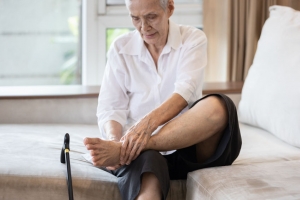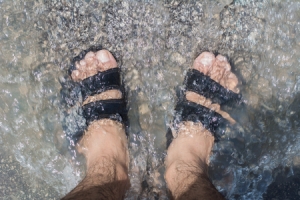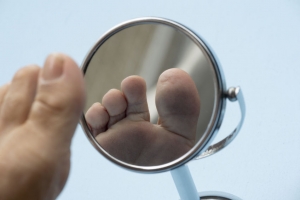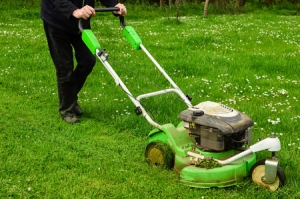Connect With Us
Blogs
Displaying items by tag: foot care tips
Avoid These 4 Podiatric Pitfalls on Vacation
At Superior Foot & Ankle Care Center we know many of our Los Angeles County patients can’t wait to take a vacation. After a year plus of Covid restrictions, you’ve got places to go and people to see! Our goal is to make sure a painful foot problem doesn’t slow you down. Below are four potential pitfalls you’ll want to avoid on your summer vacation.
- Not Wearing Socks with Sandals—Yes, you read that right. While normally wearing socks with sandals would be a fashion “faux pas,” if your trip starts with an airplane flight it’s highly encouraged. Most security checks require you to remove your shoes. Every person who walks with bare feet through the scanner machine has the potential to leave behind bacteria or fungi that can result in athlete’s foot, fungal toenails or another infection which are passed on by direct contact for the people who follow them.
- Getting New Shoes for Vacation—It’s great to find the perfect pair of shoes to go with your new shorts and sundresses, but packing them before wearing them can be a big mistake. Even though you should always try on both shoes when purchasing and spend some time in the store walking around, new shoes can still surprise you with blisters or rubbing in places you didn’t expect. Try them out at different times (your feet are largest and most swollen at the end of the day) for a day or two before you go to make sure they are comfortable and pain-free.
- Being a Bare-Foot Beach Bum—With the sun beating down on it, the sand at the beach can heat up to over 100 degrees F. Even a few steps from the parking area to your beach blanket can result in dangerous blistering burns to the soles of your feet. If you like to take walks on the beach, a pair of water shoes can also help you avoid sharp objects that can cause puncture wounds and other hazards like jellyfish that have washed up on the shore.
- Forgetting to Pack Foot Care Essentials—Even if you’re only traveling with a carry-on bag you should have room for a few small items that can make a big difference in foot comfort while on vacation. If our podiatrists, Victoria M. Foley and Dr. Constance Ornelas, have prescribed a custom orthotic, don’t leave it home! It’s also a good idea to bring moleskin to prevent painful blisters, foot powder, nail clippers, and an emery board.
We hope you and your family have a great vacation this summer. If you find a foot or ankle is hurting you when you return, or you notice other unusual symptoms in your feet, be sure to contact our Long Beach office at (562) 420-9800 office promptly for an appointment.
5 Foot Care Tips for Seniors
Did you know that the average person walks between 2.5 and 5 miles a day? At Superior Foot & Ankle Care Center we know that means our Los Angeles County senior patients have likely put quite a few miles on their feet. In honor of Older Americans Month 2021, we’d like to offer some tips for protecting podiatric health as you age.
- Listen to your feet. Foot pain, shoes that don’t seem to fit properly anymore, and fatigue in your legs or feet are all ways that your feet communicate that something isn’t right. Don’t put off seeking an evaluation of these symptoms. Contact our Long Beach office at (562) 420-9800 to schedule an appointment with our podiatrists, Victoria M. Foley and Dr. Constance Ornelas.
- Keep feet clean and dry. Wash daily with soap and water and dry thoroughly (paying particular attention to the spaces between your toes). If you tend to sweat excessively, keep an extra pair of socks with you and change when you notice your feet feel damp. This will go a long way in preventing fungal infections like athlete’s foot and toenail fungus.
- Check your feet daily. Look over your entire foot (or ask someone to do it for you) for any unusual changes. Toenail or skin discoloration, bumps, bruises and swelling may all indicate a developing foot or even systemic problem. Diseases such as diabetes, hypertension and arthritis often first manifest in the feet.
- Choose shoes wisely. Your footwear is one of the biggest predictors of podiatric health. Look for styles that have good arch support and heel and insole cushioning. Treads should be non-slip but not have rubber over the toes which can lead to tripping. Ask the podiatrist for recommendations of shoe styles if you have a deformity such as a bunion or hammertoe. Lastly, get your feet professionally measured to ensure a proper fit and always try on both shoes before purchasing.
- Reduce fall risk. Falls are the number one cause of both fatal and non-fatal injuries in seniors. Safeguard your home by installing additional stair rails and lighting. Remove throw rugs, plant stands, electrical cords that are across walking areas, and other clutter to lower your chances of falling.
Your podiatrist is your partner in making sure your feet continue to be healthy and enable you to keep on living the active life you love. If you have any questions or concerns, don’t hesitate to contact us.
7 Ways To Prevent Fungal Foot Infections
A common problem that we at Superior Foot & Ankle Care Center treat in our Los Angeles County patients is fungal infections. Conditions such as athlete’s foot and toenail fungus are very uncomfortable and can easily spread to other parts of the body as well as other people. Most fungal infections are spread by direct contact. That means there are several precautions you can take to greatly reduce your risk. Below are seven tips to help you avoid fungal infections.
- Keep your feet covered in public places. Gyms, community pools, nail salons, and seaside restrooms and changing areas all see a heavy amount of barefoot traffic. Wearing flip flops or shower shoes will prevent your feet from coming in contact with surfaces where the fungi have been deposited.
- Wash your feet daily and dry completely. This simple act will go a long way to keeping fungal and other infections away. Take extra care to dry between your toes as this is where athlete’s foot most often starts.
- Make sure socks stay dry. Fungi love dark, moist places—that’s why the inside of your socks and shoes are the perfect breeding ground. If your feet tend to perspire profusely, keep an extra pair of socks with you and change as soon as you notice your feet feel damp.
- Use foot powder. A dusting of an anti-fungal or talcum powder will aid in keeping feet dry throughout the day.
- Don’t share items that touch another person’s feet. Socks, shoes, nail files, clippers, and even towels can be a vehicle to pass on a fungal infection.
- Choose shoes made of breathable materials. This will allow for air circulation around your feet and reduce the amount of moisture trapped in your shoes.
- Alternate your shoes. It’s helpful to allow shoes to air out for a day or two between wearings.
If you are experiencing red, itchy, flaky skin on your feet or nails that are discolored, thickened, and crumbly it’s important that you schedule an appointment at our Long Beach office at (562) 420-9800. Our podiatrists, Dr. Victoria M. Foley and Dr. Constance Ornelas, will examine your feet and prescribe the correct treatment if you have a fungal infection.
April is National Foot Health Awareness Month
Feet are often taken for granted and not given much attention, but in April we celebrate National Foot Health Awareness Month. At Superior Foot & Ankle Care Center, we want to take this opportunity to share with our Los Angeles county patients some simple steps you can take to protect the health of your feet and avoid many common podiatric disorders.
- Inspect your feet regularly. When is the last time you really looked at your feet? Changes in skin color or the condition of your toenails, unexplained bruising, lumps, and cuts that don’t heal are all potential signs of a foot problem. Many deformities like bunions and hammertoes also occur gradually. The majority of podiatric disorders can be more easily and better treated in their early stages. If you spot anything concerning, contact our Long Beach office at (562) 420-9800 and make an appointment with our podiatrists, Victoria M. Foley and Dr. Constance Ornelas, so that they can examine your feet and determine if there is an issue that needs to be addressed.
- Make smart shoe choices. One of the most important determining factors for the health of your feet is what you put on them. Proper fit is essential. Don’t wear shoes that feel tight or squeeze your toes together. Look for styles with roomy toe boxes, good arch support, and a firm fit around the heel. Avoid spending too much time in heels over two inches high.
- Practice good hygiene. Wash feet daily. Dust with anti-fungal or talcum powder if your feet tend to sweat excessively and moisturize at night with a good moisturizer.
- Engage in a healthy lifestyle. We sometimes forget that what we do with the rest of our body most definitely impacts the health of our feet. High cholesterol, for example, can lead to poor circulation which diminishes the ability of oxygen and nutrients needed for healing to reach your feet in a timely manner. Eating a nutritious diet, maintaining a healthy weight, not smoking, and exercising regularly will all benefit your feet as well.
If you have questions about how to best take care of your feet and ankles, contact us today.
Get Mowing—Safely
Each year nearly 85,000 people take a trip to the emergency room because of an injury sustained from a power mower, and a large number of these are to the feet and ankles. Sadly, a large percentage of these injuries occur in children. At Superior Foot & Ankle Care Center we want to help our Los Angeles County patients avoid contributing to these statistics. Below are some important reminders for using power mowers safely.
Avoid Mechanical Difficulties—many mowers today have several built-in safety features. Know and care for your mower properly:
- Read the user manual! It may not be the most scintillating read, but it can protect your feet and the rest of your body by helping you understand how to properly operate your mower.
- Perform recommended annual maintenance on your mower or have it serviced professionally.
- Do not try to “modify” or fix your mower, even temporarily with homemade repair jobs.
Child Proof Your Mow—to help protect the youngest members of the family:
- Never take children for rides on the mower. Tragically, getting on and off mowers are prime danger zones for small feet and toes.
- Keep children indoors while you mow if possible.
- If children are outside, instruct them not to try to get your attention or approach you when the mower is on.
- Teach children not to climb on or touch a mower when it is off. Many children have been burned by mowers that are cooling down or cut themselves on the sharp blades.
Follow Safe Mower Practices—although many mowing safeguards may be common sense, they bear repeating:
- Don’t mow a wet lawn. Slippery grass makes it easy to lose control of the mower.
- Wear sturdy shoes. It may be hard to believe, but many injuries that land people in the emergency room happen to those who are mowing barefoot or in flip-flops. Mower blades whirl at over 3,000 rotations per minute—choose the most protective shoes you own.
- Pick up the lawn before you mow. Mowers have the kinetic energy of a .357 handgun and when they run over objects in the lawn they can shoot out at high speed and hurt someone nearby.
Any mower injury needs immediate treatment. If it is serious, contact our Long Beach office at (562) 420-9800 and let our podiatrists, Dr. Victoria M. Foley and Dr. Constance Ornelas, assess the condition of your foot or ankle.





